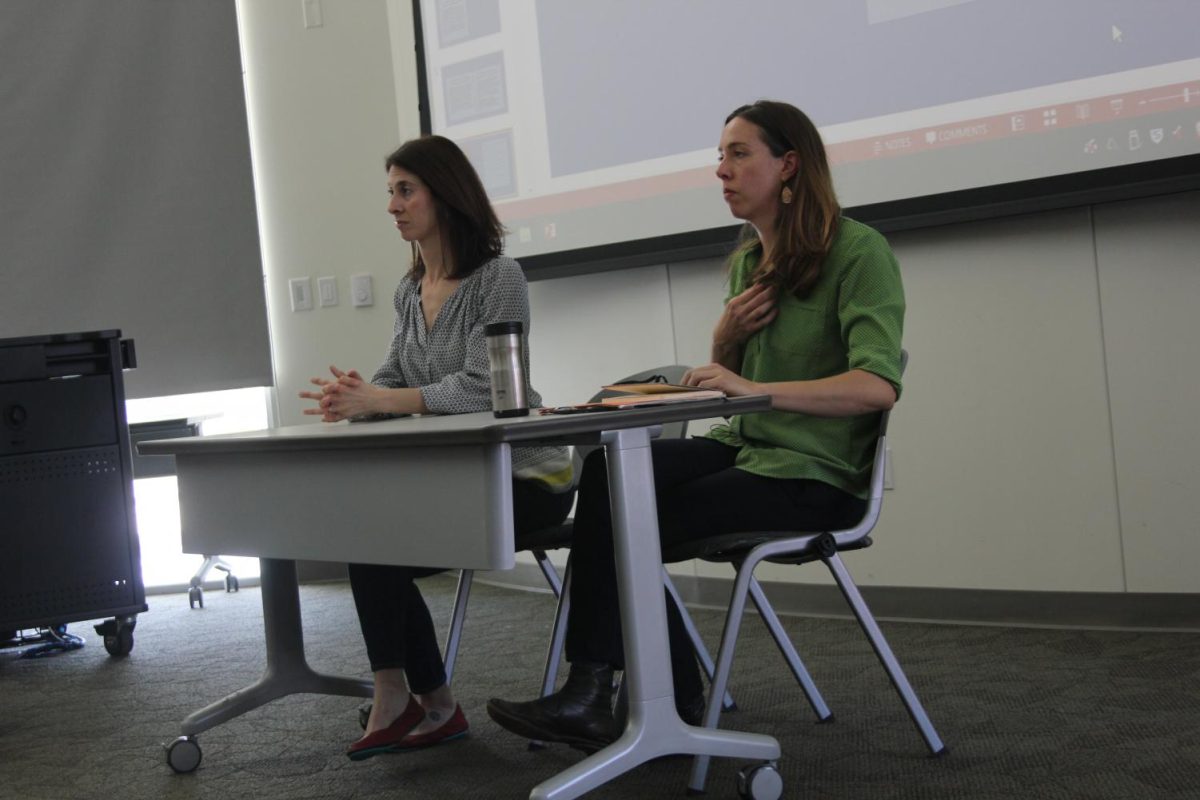Speakers address reproductive rights and unconscious bias against women of color
California State University Sacramento History Professor Rebecca Kluchin and California Polytechnic State University Political Science Professor Jennifer Denbow answer 21-year-old international relations major Maria Roman’s question of how women can manage their health if men trivialize their pain.
Professors Jennifer Denbow and Rebecca Kluchin talked about their research on reproductive rights in the WINN Community Room on March 12.
Denbow, an assistant political science professor at California Polytechnic State University and Kluchin, a history professor at California State University Sacramento, spoke to approximately 70 people about their research on sterilization and the personhood of fetuses.
“The larger movement for reproductive justice has gotten lost,” Kluchin said.
During her presentation, Kluchin said that women of color have historically been left out of the reproductive justice movement.
“At its core, reproductive justice is about intersectionality,” Kluchin said.
During her presentation, Kluchin said that Loretta Ross coined the term “reproductive justice” in 1994. She further mentioned that Ross helped get the intrauterine device off the market, which is a device inserted into the uterus to prevent a person from getting pregnant.
Kluchin talked about the experience of Nial Cox Ramirez with non-consensual sterilization. She said that because she was a black woman on welfare, it showed that she was “unfit” to have more children.
“Doctors assume that because of their ethnicity, they have too many children,” Kluchin said. She further added that doctors believed it was their “responsibility” to stop it.
In her research, Kluchin had found more than 20 incidents of forced sterilization.
During her presentation, Denbow discussed the use of ultrasounds in the role of personifying fetuses.
“Ultrasounds formed ideas about pregnancy and what a fetus is,” Denbow said.
Denbow said that ultrasounds look at fetuses as a “separate personhood.” She later said that the belief in the medical community that a fetus can exist on its own ignores that they’re connected to another person.
In her research, Denbow studied whether ultrasounds made bonding between a mother and her child any better, and said that was “inconclusive.”
During a Q&A, 21-year-old international relations major Maria Roman asked the speakers how women can manage their health if men trivialize their pain.
Kluchin acknowledged that there is an unconscious bias against women of color in the medical community. Denbow additionally said there needs to be training at an academic level so that doctors can be more understanding and women don’t end up advocating for themselves.
“We’re telling women that they need to be their own advocates,” Denbow said.
Shani Zuberi, a 20-year-old film production major, said that she didn’t think a fetus was considered separate from their mother.
“In normal circumstances, they’re considered together,” Zuberi said.
Hieu Nguyen, an 18-year-old engineering major, said that it was informative.
“It was nice,” Nguyen said. He further added that he had no prior knowledge about the topics before the event.
Denbow said that events like this are important for students to understand.
“It’s essential to our understanding of bodies and how experts understand and manage our bodies,” Denbow said.

